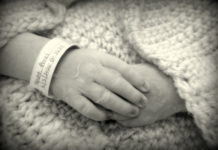As parents, there are times when we can feel like we are drowning. For some, it’s having a handful of kids under the age of six. For some, it is trying to figure out how to pay next month’s grocery bill, the babysitter, and the frozen pipe that suddenly burst. And for some, it is navigating the murky waters of the medical world.
For me, it began with a phone call from the pediatrician, “Go immediately to the emergency room. Do not stop to pack a bag. I do not even understand how your baby is alive. Leave right now!!” Thus began the scariest and most overwhelming journey of my life.
Sitting in the hospital room, feeling so unsure of what was happening, watching my poor sickly baby struggle against wires and machines, and be constantly pricked with needles was soul wrenching. I don’t think I have ever thought, “Why me?” the way I did during those two weeks. It took a long time for the doctors to stabilize him, all the while warning me that he might not survive, and if he did, he might have brain damage, chas veshalom. It then took even longer for them to figure out what was wrong with him in the first place. I was so overwrought, I could barely even daven. I was just in shock and disbelief, thinking I must be having some kind of out-of-body experience, because there was no way this was really happening to me.
What made it even more overwhelming was the fact that we were in Israel, six thousand miles away from our families and support systems. My husband and I were very young and had only been married two years. We were still struggling to figure out the direction our lives would take. We felt so afraid and so alone.
After the most harrowing two weeks of our lives, my son was finally released from the hospital, with an extremely uncommon diagnosis and a very vague idea of a course of medical action. Over the next few years, we met with many more medical challenges, attempted to make up for lost time in getting our son the help he needed, and do our best to handle a very misunderstood condition. In addition, we had to contend with having another new baby in the house. I felt like my head was constantly underwater. Managing a job was impossible while taking care of my two little ones and all their medical needs. I wondered if my family would come out of all of this intact. I couldn’t see past getting through each day.
When I was in seminary, I had a vision of what my life would be like. I never imagined that the happy-go-lucky dream I had would be so far from my reality. I didn’t fathom how hard it would be to cope with the struggles I faced. My hopes of a perfect bayis were not supposed to come crashing down on me like this!
It took a long time to stabilize my son and my life. There were years of medicine tweaking, therapies, procedures and programs, nursing staff, and hospital stays. Nights were sleepless for a long time and the worrying and stress was very difficult. Baruch Hashem, after many years, my son and my family are doing well. My son’s condition is now very manageable, and he lives the life of a normal eleven-year-old boy. So much so, that I get angry glares when I park in the handicap spot, even with my handicap placard on the mirror!
I wanted to share my story to tell you that there is always a light at the end of the tunnel. It might seem extremely far away, barely even visible at times, but it exists! Not only can the tunnel finally end on stable ground, but the gratitude that rough times leave you with can be, in itself, overpowering sometimes. I look around now at what Hakadosh Baruch Hu has granted me with and am so grateful for all the brachos of my life. Beginnings can be hard, but they give us something to look back at and see how far we have come. Of course, there are still struggles and we need to keep medically vigilant, but the level of intensity has definitely died down. And for that, I am extremely thankful to Hashem.
Besides assuring those struggling that there will be an end to the chaos, I wanted to impart some things I have learned along the way. First and foremost, do your homework! We have been to all kinds of “specialists” in their field who ended up not knowing very much about what was best for my children and our family. I have noticed that some doctors believe their way is the only way. They have a hard time hearing anything you are saying and don’t take your feelings or opinions into account. Make sure that you do extensive research and can discuss what you have learned in a way that benefits your child. Knowledge is power! If your doctor doesn’t hear your questions and concerns, LEAVE! It took us almost ten years before we found the specialist who we really like and trust, who understands his medical condition inside and out, and who is actually helpful.
This brings me to my next very important point. YOU are the best advocate for your child. You know your child best and are the most qualified to help him or her. Get out that angry mama bear and stand up for your child, because if you don’t, it is very easy to get lost in the shuffle. Medical documents that never come, appointments that won’t be made, medicines that have side affects, doctors that will push you into procedures that may not be needed; there is a long list of things that need constant scrutiny. This whole experience has taught me how to fight for my children and to put their safety and quality of life first. The phone has become my weapon and my previously self-conscious voice has become strong and sure. I have not always won every battle, but I know that I have done my due diligence, in a way that I never thought I would at the beginning of this journey.
I have also learned to ask for help. When we decided to move back to Baltimore for the medical care and support, we discovered there are so many amazing organizations in our town to help with all kinds of things, sometimes things we did not even realize we needed. Gevuras Yarden, Bikur Cholim, and Chai Lifeline stepped in with volunteers to clean our house, cook our dinners, and send away our laundry to be washed. They sent us to a Pesach hotel to give us a much needed break. They introduced us to a nurse to sit overnight with my son in the hospital, and he in turn became an extremely helpful family friend. They led us to PACT, a medical daycare with a full nursing staff, to give me some relief during the day. In truth, the list of resources and services here are abundant. We are very lucky to live in such a thriving Jewish community with so much help for those who need it.
I also made a lot of supportive new friends who were involved in some of these (and other) wonderful organizations. It is so important to connect with people who are going through similar experiences as you. Many people I knew were not sure what to say to me, since they couldn’t relate to what I was experiencing. This made a lot of situations uncomfortable. Forging friendships with people who didn’t feel awkward around me, who knew just what to say, and who could share their own stories and wealth of resources was so instrumental in the healing process.
We live in a very well-connected, digital era. Besides local support, there seems to be a group for just about everything on email and social media these days. These forums are a great place to ask specific questions to people who have already been where you are. I have found the knowledge of the members in these groups of utmost value. They have helped me countless times and have given me reassurance that what we are experiencing is “normal” for what we are dealing with. I even got the name of the amazing specialist mentioned earlier from one of these online support groups! I am so pleased to live in a time where I can get referrals from people across the country.
A good therapist who specializes in these issues can also be helpful. A lot of people are ashamed to ask for help from a professional, as they feel it makes them seem weak or not put together. This is simply not the case. Sometimes it takes an outsider to organize our thoughts for us and make us see solutions in our lives from another perspective that we might not have been able to see on our own. It takes a strong person to know when they need help and to ask for it.
Nowadays, I try to focus on the blessings that I have. I endeavor to use the challenges as a way to grow closer to my Creator, the One who clearly sees what I need to fulfill my tafkid, even if I don’t always understand why things unfold as they do. I recognize that in walking along this path, I have gained a lot of strengths and developed certain middos that I might not have otherwise had, and I have learned to cope in a way I never thought possible. May we all find the inner strength to pull through life’s challenges with grace, appreciation, and a closer relationship with Hashem.










